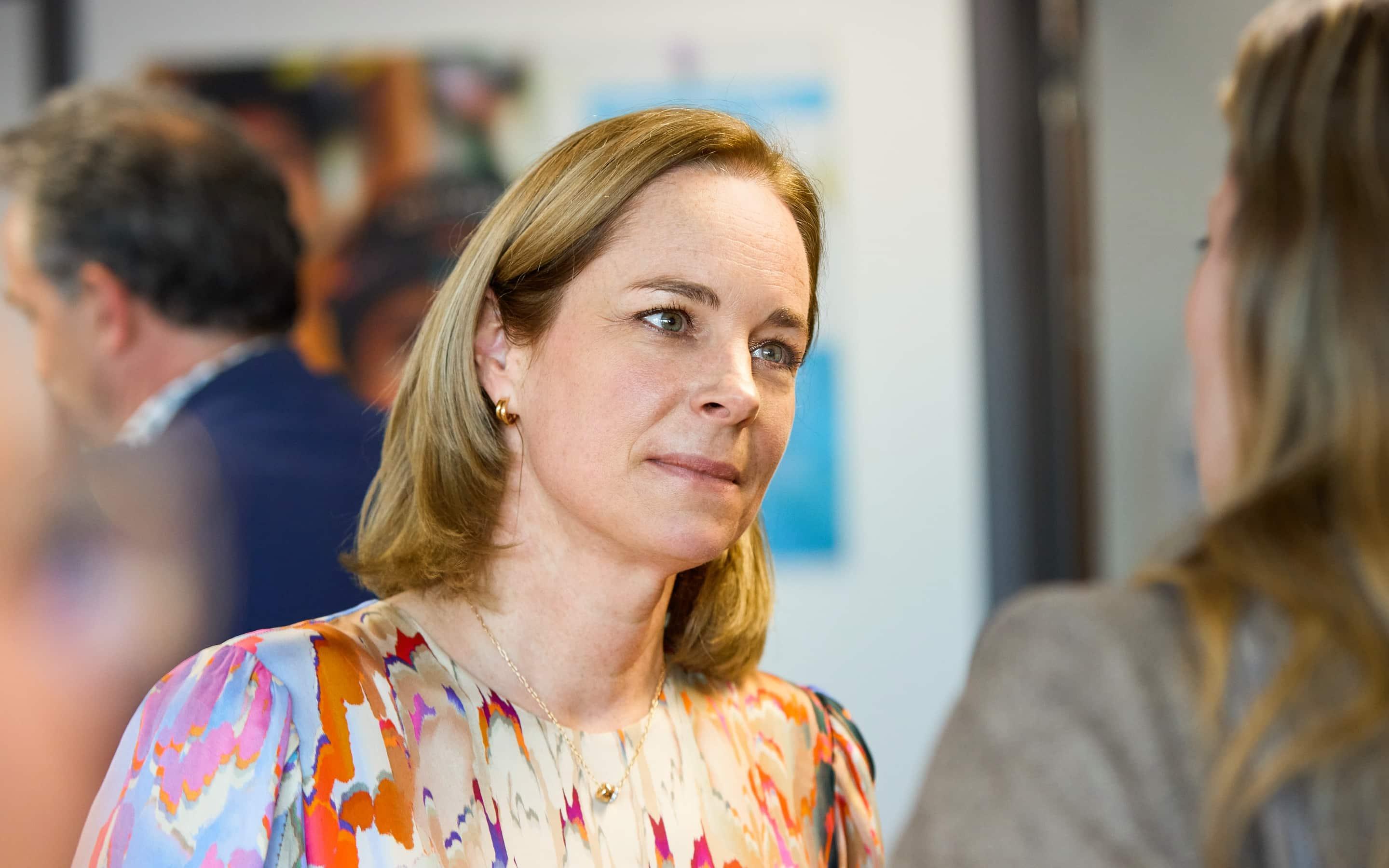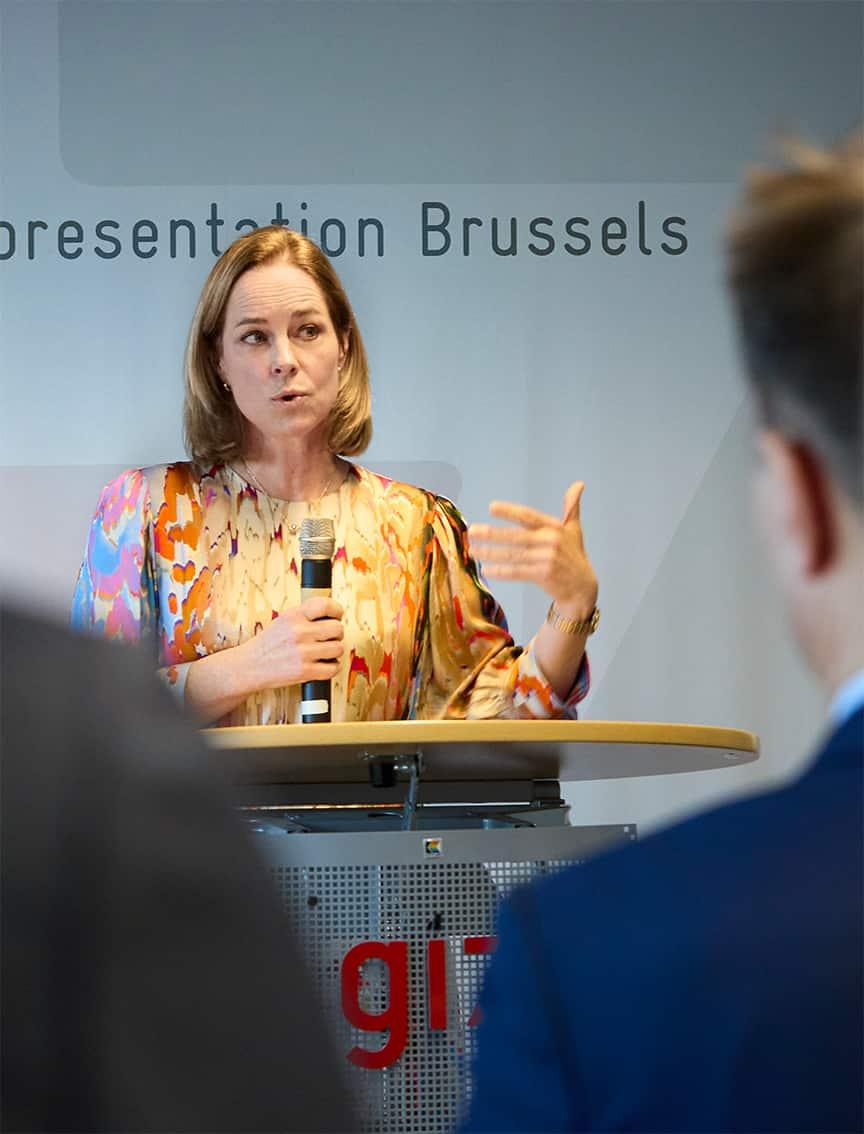The EU’s Critical Raw Materials Act aims to keep European industry reliably supplied with critical raw materials from sustainable operations. To this end, domestic supply chains are to be strengthened, strategically important raw materials prioritised and mutually beneficial partnerships established with non-EU states.
 GIZ/Alun Foster
GIZ/Alun Foster
‘GIZ’s expertise is incredibly valuable’
Hildegard Bentele, Vice-Chair of the European Parliament’s Committee on Development, talks about learning from crises, the EU’s place in the current geopolitical rivalry and what GIZ offers in international cooperation.
Ms Bentele, given the current dynamic geopolitical situation, what do you see as the EU’s role in international cooperation?
The world is changing dramatically – in the European context as elsewhere. We are facing the decision of the Trump administration to completely suspend the work of the development agency USAID. That decision jeopardises the lives of millions of people in the Global South.
The withdrawal of the USA leaves a vacuum that could easily be filled by non-western actors like China and Russia. They are endeavouring to increase their influence in the world and secure supply chains for themselves. In the existing geopolitical situation, the European Union must compete with other actors. Our services aim to establish partnerships and long-term, stable, mutually beneficial cooperation. The EU offers a huge market with high standards, but also the philosophy of the social market economy, liberty and human rights. These are competitive advantages that we should stress more.
In this time of heightened rivalry, how can the EU ensure that its development policy is aligned with the interests and needs of partner countries?
The EU’s development policy is not just about delivering assistance. It’s about fostering mutually beneficial partnerships. We must be honest when we’re talking about interests – our own and those of our partners. Let me give you one example – economic growth is often the most essential factor for our partners. New jobs and economic opportunities for the majority of the population depend on developing industries and establishing effective farming practices. This can only be achieved if the megacities of the South are supplied with regional food products and not with western imports.
We, the EU, are working to help our partners improve their position in value chains, and create new industries. This, in turn, means that we need to modernise our economic partnership agreements. In my view, the current agreements do not enable partner countries to develop their own industries. They only shield existing industries from customs duties. Recognising and addressing these shortcomings is only one of the ways we can align our interests with those of our partners.
You are a major advocate of the Global Gateway Strategy and green hydrogen projects. Is there a specific area where you would like to see GIZ expand its portfolio?
Hydrogen can play an important part in decarbonisation and help save energy, but this will mean importing vast quantities from other regions. I am delighted that GIZ is already implementing green hydrogen projects around the globe, from Angola to Colombia and Kazakhstan.
Our goal must now be to scale up Global Gateway projects, but we should not limit ourselves to ‘hard’ infrastructure. Soft power, or enabling power, is every bit as important, and we can exercise it through technical support.
In conjunction with the Critical Raw Materials Act I would like to encourage GIZ to continue to drive forward the responsible extraction of raw materials, ideally on a coordinated European basis. It is critically important that projects in the field of sustainable development in particular do not simply come to an end, but that they are continued or relaunched. We need these sustainable partnerships to master our own critical dependencies.
 GIZ/Alun Foster
GIZ/Alun Foster
Hildegard Bentele is Vice-Chair of the Committee on Development in the European Parliament, where she belongs to the Group of the European People’s Party.
From an EU stance, how do you see GIZ’s work?
GIZ has decades of experience and a vast network of experts at local level, making it an important actor in implementing EU-financed development projects. GIZ’s expertise is incredibly valuable for decision-makers. GIZ plays a key part in cooperation with regional organisations, local groups and civil society, especially on the African continent. It acts as an important mediator, facilitating contacts between local actors and actors at EU level. It can also help encourage stakeholders to act in regions with hitherto unexploited potential. The EU should harness GIZ’s expertise to enrich and diversify its own partnerships.
‘The EU should harness GIZ’s expertise to enrich and diversify its own partnerships.’
What role will Germany play in future in the EU’s international cooperation? Do you expect any dramatic changes?
Well, we’re going through a period of upheaval and it’s time for dramatic changes. To use a well-known quote, ‘Never waste a good crisis!’ We need to put an end to fragmented responsibility that leaves policies in the hands of several different ministries. We need to develop a structured, coordinated approach that is managed at European level. Around the world, we see a huge need for cooperation with Germany and the EU. But the services we offer are often too complicated, tied to too many conditions, and under-financed.
I expect the new German Government to use the opportunity it now has to counter the fragmentation of foreign policy and to begin at last to address development, economic affairs, trade, migration and climate together. The EU’s Global Gateway initiative that focuses on both our own interests and those of our partners in areas such as energy, infrastructure and digitalisation has already marked a change of direction towards a new, more economically oriented foreign and development policy at European level. I would recommend that Germany take a similar approach.
EU Committee on Development
The Committee on Development is one of 22 standing committees of the European Parliament. The MEPs who sit on the Committee on Development monitor all European development cooperation and are in dialogue with partner countries worldwide.